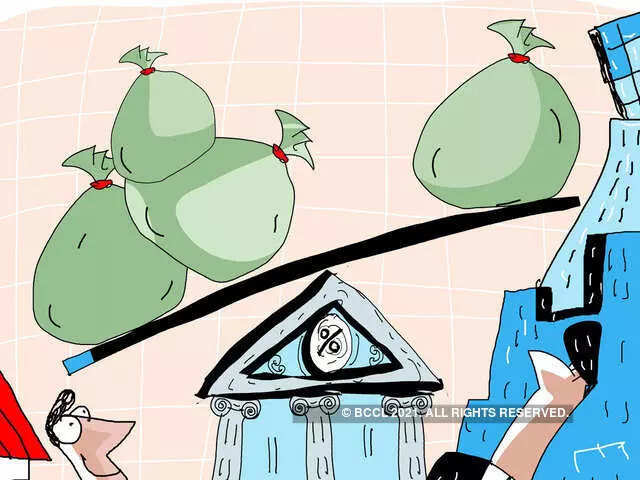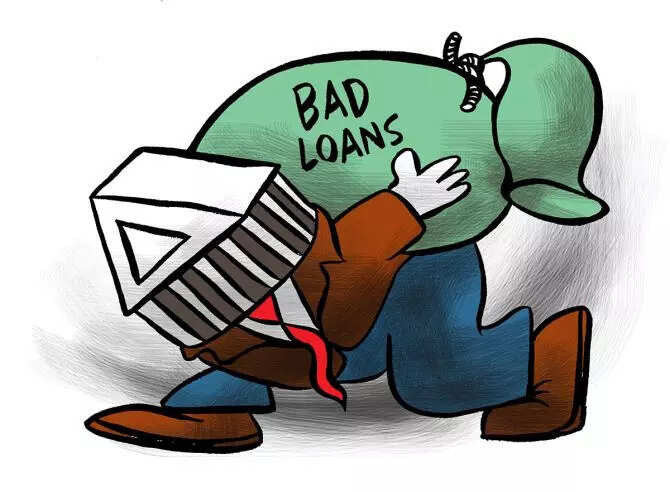The
National Asset Reconstruction Company (
NARCL), or
bad bank, is likely to get the first tranche of bad assets worth about Rs 90,000 crore by January 2022, according to a report. In the first phase, fully-provisioned toxic assets will be transferred.
Finance Minister Nirmala Sitharaman in the budget for 2021-22 had announced that an asset reconstruction company or a bad bank would be set up to consolidate and take over existing stressed assets of lenders and undertake their resolution. A bad bank refers to a financial institution that takes over bad assets of lenders and undertakes resolution.
Last month, the Cabinet had approved a proposal to offer sovereign guarantee on the security receipts (SRs) issued by the NARCL, It is estimated to cost the govenrment Rs 30,600 crore over five years.
Recovery hopes
The bad bank hopes to recover between Rs 50,000 crore and Rs 64,000 crore through the resolution of bad loans amounting to Rs 2 lakh crore.

The lowest recovery is seen at 25 per cent or Rs 50,000 crore, while the highest recovery rate is pegged at 32 per cent, or Rs 64,000 crore. The most likely recovery has been pegged at 28 per cent or Rs 56,000 crore.
The NARCL will buy the assets around Rs 36,000 crore or, about 18 per cent of the book value of Rs 2 lakh crore assets. About 15 per cent of Rs 36,000 crore would be paid by NARCL to banks in cash and the remaining 85 per cent via security receipts guaranteed by the Centre.
Close to liquidation
Though banks have made 100% provision for these assets, Rajkiran Rai, MD & CEO of Union Bank of India, does not expect more than 20-25 per cent recovery from these legacy accounts, he told a television channel.
The State Bank of India has identified NPAs with Rs 17,000-18,000 crore outstanding to be transferred to the NARCL, while Punjab National Bank has identified Rs 8,000 crore worth of NPAs, Union Bank of India Rs 7,800 crore of NPAs to be transferred to the National ARC. The Bank of India has identified about Rs 5,500 crores of assets for transfer while Indian Bank about Rs 1,900 crore.
Assets

Banks have identified Rs 82,496 crores worth of bad loans that could be transferred to the NARCL, which has names like Videocon’s VOVL (Rs 22,532 crores total exposure), Reliance Naval and Engineering Ltd (Rs 8,934 crore), Amtek Auto (Rs 9,014 crore), Jaypee Infratech (Rs 7,950 crore, Castex Technologies (Rs 6,337 crore), GTL Ltd (Rs 4,866 crore), Visa Steel (Rs 3,394 crore), Wind World India Ltd (Rs 3,161 crore), Lavasa Corporation (Rs 1,424 crore), Consolidated Construction Consortium Ltd (Rs 1,353 crores).
Several assets such as Videocon have seen realisable value close to liquidation value in NCLT proceedings. Many big-ticket resolutions at IBC have seen haircuts over 90%. With most of the NPAs proposed to be transferred to the bad bank being old legacy NPAs, there has been an erosion in value, making them more likely to head to liquidation.
Lavasa Corporation has got bids worth Rs 700 crore for loan claims of over Rs 8,000 crore at NCLT.

